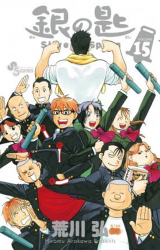THIS MANGA HAS EVERYTHING
A review.
Hiromu Arakawa has veered from Alchemy-and-the-Meaning-of-Religion territory and dived right into the Slice-of-Life Valley with Silver Spoon, or, Gin no Saji (she only mentions the namesake of the manga in one chapter in the first volume and leaves it alone; wonder what it means), which is soon to get an anime adaptation, now as of this writing. This is not the first time Arakawa has talked about the reality of a young dairy farmer. Actually, she's gone into it with another manga about her own life, of which there are only a few chapters scanlated, so far.
This time the main character is a sweet looking kid with somewhat fierce eyes behind his thick glasses, a kid entering an agricultural high school in the northern tip of Japan, Hokkaido. So far there's less than 60 chapters out which I've just marathoned. And my verdict?
BASIC BREAKDOWN.
Actually this is a classed up boyish-type comedy manga in quite a few ways. Minus the fan service you get cute girls who're realistically characterized but when drawn are not (hallelujah) all that flat, and furthermore there are a horde of cool figure-drawings of humans and animals, plus technical specs on machinery, and plenty of strong images of typical anime otakudom, and to add to pictures of the daily labours of farming, baseball scenes (to complement the many horse-sled--race scenes) along with other sports references.
It's also about education and learning new things.
There's great comedy, visual gags with good pacing, jokes your friends would make, ironic situations you'd NEVER want to be in....
It's also great to see how people live, work, and study collectively to prepare for, make, and eat their own food together and then clean everything up together.
Did I mention a budding romance?
And one more thing... DELICIOUS FOOD (PICTURES)!!!!
Yup, this manga basically has everything.
TECHNICALLY SPEAKING.
Really I read it for how well Arakawa can express very human worries and show how people slowly work through things like their fears, their issues, their hangups, and how they work towards things like preparing for a difficult career or going through a summer job for some spending money, all while doing backbreaking labour most people don't really ever do anymore. There are clear moral issues that are taken on that, since they come out so strongly in the plot and so relentlessly, come off somewhat heavy handed, but they are given along with a lot of other good questions, coming from such a hard place as the primary sector of a highly-industrialized capitalist but somewhat isolationist society as Japan: What if you don't have a choice but to work hard to make a profit, or else just go off and die? What if you're the human beings that are deciding this fate for hundreds, thousands of sentient beings throughout your career? What if your own future track in life is like that black and white/life or death situation too? What do you do when for this reason people hurt you both actively and passively? How do you get out of it and properly justify yourself? What about other people that are getting ground down slowly? Why do people love money so goddamn much?
I personally think a single devastating moment in chapter 56 alone is reason enough to read this.
FINAL WORD?
TRY READING IT!! Right now! Arakawa's got a winner!





